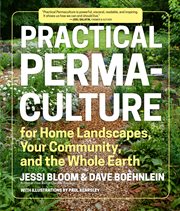Nonfiction
eBook
Details
PUBLISHED
Made available through hoopla
DESCRIPTION
1 online resource
ISBN/ISSN
LANGUAGE
NOTES
"This permaculture primer is fresh and vibrant. Bring it on!" -Permaculture Magazine Permaculture is more popular than ever, but it can still be a daunting concept. If you are new to permaculture and interested in learning more, Practical Permaculture offers authoritative, in-depth, and hands-on advice for a more holistic approach to sustainable living. Jessi Bloom and Dave Boehnlein, two dynamic leaders in the permaculture community, explain the basics of permaculture, share their design process, and explore various permaculture systems including soil, water, waste, energy, shelter, food and plants, and animals and wildlife. They also profile the fifty most useful plants for permaculture landscapes. Can you imagine a world in which your thriving garden nourishes all of your needs? The first step to building a sustainable ecosystem starts with Practical Permaculture. Jessi Bloom is a best-selling author, award-winning ecological landscape designer, and speaker. She owns N.W. Bloom EcoLogical Services, based in the Pacific Northwest, which is known as an innovator and leader in the field of permaculture, sustainable landscape design, construction, and land management. Her work has been recognized by government agencies and industry organizations and makes headlines in national media. She lives near Seattle with her two sons on their permaculture homestead, which is full of functional gardens and rescue animals. Dave Boehnlein serves as the education director at Bullock's Permaculture Homestead on Orcas Island, Washington. He is also the principal and a founder of Terra Phoenix Design, and a member of the Cascadia Permaculture Institute. His freelance teaching services are highly sought after by universities, nonprofits, and other organizations. Boehnlein received a diploma in permaculture education from the Permaculture Institute of North America, of which he is now a member and field advisor. Ultimately, he just wants to make the world a better place and eat really good fruit while doing it. Paul Kearsley, a skilled designer with a passion for art and nature, collaborates with like-minded professionals to create inspiring models of sustainability. He has been an integral part of both institutional- and residential-scale permaculture design companies. As art director for Terra Phoenix Design, he has worked with world-class designers from California to Peru. On a local scale, Paul helped create Homestead Habitats LLC, a landscape contractor that specializes in designing and installing edible landscapes for urban and suburban homes. He currently teaches design courses at Western Washington University's College of Engineering. Preface "Humankind has not woven the web of life. We are but one thread within it. Whatever we do to the web, we do to ourselves. All things are bound together. All things connect." -Chief Seattle Each reader may come to this book on a different path, but we all have something in common: we're human, in this together, and we belong to the intricate web of life that Chief Seattle describes. We are all born into that connection and are hardwired to feel it, but depending on our experience in life, we may be pulled away from it. Humans are inherently always looking for a better quality of life-for health, happiness, comfort, and financial stability, among other things. However, it is easy to look ahead and see that many of the choices we as a species have made in that quest are not going to sustain us. We are at a crossroads and need to start making changes. Many of us rely on systems that are beyond our control-the industrial food system, municipal waste and water systems, the energy grid, to name a few. But we don't have to rely on those systems-we can be more self-sufficient and take back the reins. We can remember that human life has an ecological purpose
Mode of access: World Wide Web







